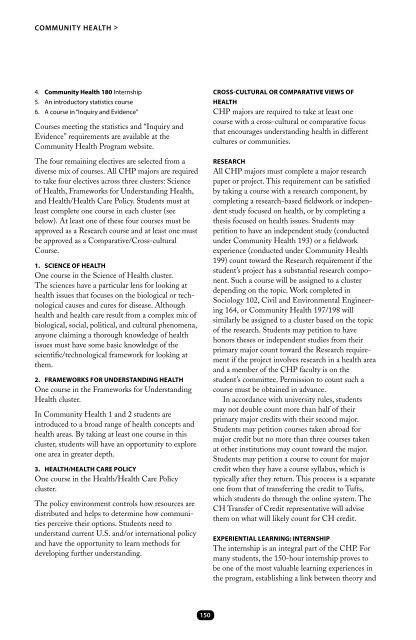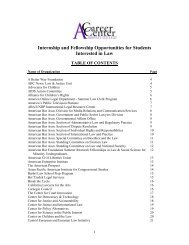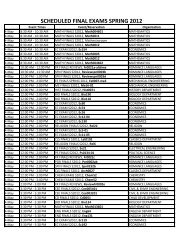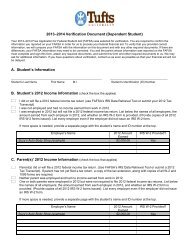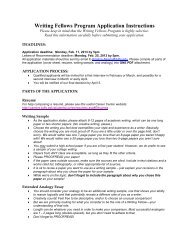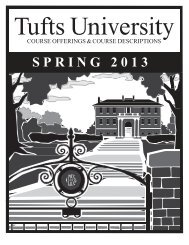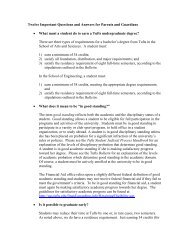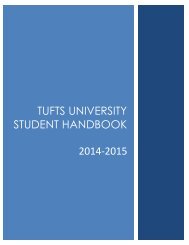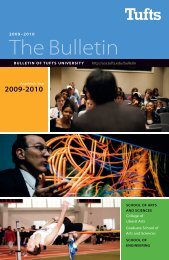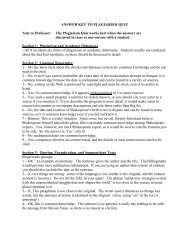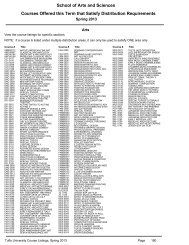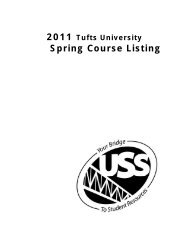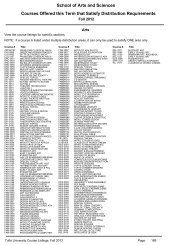2013â2014 The Bulletin - USS at Tufts - Tufts University
2013â2014 The Bulletin - USS at Tufts - Tufts University
2013â2014 The Bulletin - USS at Tufts - Tufts University
Create successful ePaper yourself
Turn your PDF publications into a flip-book with our unique Google optimized e-Paper software.
Community Health ><br />
4. Community Health 180 Internship<br />
5. An introductory st<strong>at</strong>istics course<br />
6. A course in “Inquiry and Evidence”<br />
Courses meeting the st<strong>at</strong>istics and “Inquiry and<br />
Evidence” requirements are available <strong>at</strong> the<br />
Community Health Program website.<br />
<strong>The</strong> four remaining electives are selected from a<br />
diverse mix of courses. All CHP majors are required<br />
to take four electives across three clusters: Science<br />
of Health, Frameworks for Understanding Health,<br />
and Health/Health Care Policy. Students must <strong>at</strong><br />
least complete one course in each cluster (see<br />
below). At least one of these four courses must be<br />
approved as a Research course and <strong>at</strong> least one must<br />
be approved as a Compar<strong>at</strong>ive/Cross-cultural<br />
Course.<br />
1. Science of HEALTH<br />
One course in the Science of Health cluster.<br />
<strong>The</strong> sciences have a particular lens for looking <strong>at</strong><br />
health issues th<strong>at</strong> focuses on the biological or technological<br />
causes and cures for disease. Although<br />
health and health care result from a complex mix of<br />
biological, social, political, and cultural phenomena,<br />
anyone claiming a thorough knowledge of health<br />
issues must have some basic knowledge of the<br />
scientific/technological framework for looking <strong>at</strong><br />
them.<br />
2. FRAMEWORKS for UNDERSTANDING HEALTH<br />
One course in the Frameworks for Understanding<br />
Health cluster.<br />
In Community Health 1 and 2 students are<br />
introduced to a broad range of health concepts and<br />
health areas. By taking <strong>at</strong> least one course in this<br />
cluster, students will have an opportunity to explore<br />
one area in gre<strong>at</strong>er depth.<br />
3. HEALTH/HEALTH Care POLICY<br />
One course in the Health/Health Care Policy<br />
cluster.<br />
<strong>The</strong> policy environment controls how resources are<br />
distributed and helps to determine how communities<br />
perceive their options. Students need to<br />
understand current U.S. and/or intern<strong>at</strong>ional policy<br />
and have the opportunity to learn methods for<br />
developing further understanding.<br />
Cross-cultural or COMPARATIVE VIEWS of<br />
HEALTH<br />
CHP majors are required to take <strong>at</strong> least one<br />
course with a cross-cultural or compar<strong>at</strong>ive focus<br />
th<strong>at</strong> encourages understanding health in different<br />
cultures or communities.<br />
Research<br />
All CHP majors must complete a major research<br />
paper or project. This requirement can be s<strong>at</strong>isfied<br />
by taking a course with a research component, by<br />
completing a research-based fieldwork or independent<br />
study focused on health, or by completing a<br />
thesis focused on health issues. Students may<br />
petition to have an independent study (conducted<br />
under Community Health 193) or a fieldwork<br />
experience (conducted under Community Health<br />
199) count toward the Research requirement if the<br />
student’s project has a substantial research component.<br />
Such a course will be assigned to a cluster<br />
depending on the topic. Work completed in<br />
Sociology 102, Civil and Environmental Engineering<br />
164, or Community Health 197/198 will<br />
similarly be assigned to a cluster based on the topic<br />
of the research. Students may petition to have<br />
honors theses or independent studies from their<br />
primary major count toward the Research requirement<br />
if the project involves research in a health area<br />
and a member of the CHP faculty is on the<br />
student’s committee. Permission to count such a<br />
course must be obtained in advance.<br />
In accordance with university rules, students<br />
may not double count more than half of their<br />
primary major credits with their second major.<br />
Students may petition courses taken abroad for<br />
major credit but no more than three courses taken<br />
<strong>at</strong> other institutions may count toward the major.<br />
Students may petition a course to count for major<br />
credit when they have a course syllabus, which is<br />
typically after they return. This process is a separ<strong>at</strong>e<br />
one from th<strong>at</strong> of transferring the credit to <strong>Tufts</strong>,<br />
which students do through the online system. <strong>The</strong><br />
CH Transfer of Credit represent<strong>at</strong>ive will advise<br />
them on wh<strong>at</strong> will likely count for CH credit.<br />
Experiential Learning: Internship<br />
<strong>The</strong> internship is an integral part of the CHP. For<br />
many students, the 150-hour internship proves to<br />
be one of the most valuable learning experiences in<br />
the program, establishing a link between theory and<br />
150


